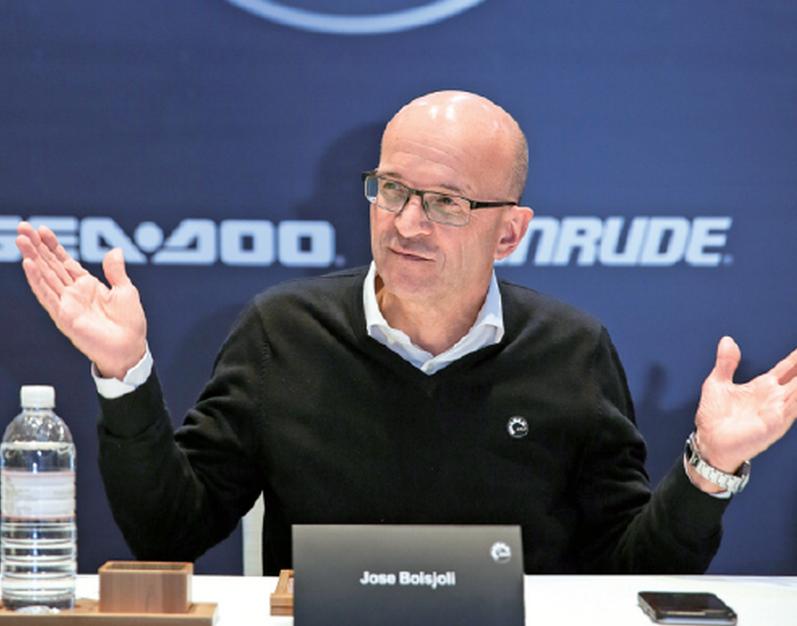Energizing Chinese adventure spirit


Jose Boisjoli leads BRP's drive to introduce power products and leasing model for rough sports
Jose Boisjoli, president and CEO of BRP, or Bombardier Recreational Products Inc, believes senior executives must have outstanding ability to manage their time well.
The head of the Quebec, Canada-headquartered manufacturer of snowmobiles, watercraft and off-road vehicles, has a simple philosophy: hard work and a balanced approach are key to a successful life.
Those three abilities - time management, hard work and a balanced approach - have helped Boisjoli to push three product lines into the China market, where a consumption upgrade and the run-up to the 2022 Beijing Winter Olympics are proving to be timely advantages.
Every time he visits China, he can't stop thinking about how many Chinese cities BRP's products have yet to reach. "We see China as a big, big opportunity. We see it as a must-have and not a nice-to-have," he said during an early morning interview in Shanghai, after an overnight flight from Xi'an.
An outdoor sports enthusiast, Boisjoli said China is no longer the distant outpost it once was for BRP.
BRP is in talks with local partners in Chongqing municipality and the three autonomous regions of Guangxi Zhuang, Inner Mongolia and Xinjiang Uygur to further expand its dealership network in China.
It also plans to introduce the product leasing business in China via tailor-made packages. Consumers can rent the products on certain days or a few weekends, instead of buying them. It's a business model that is fairly popular in North America and Europe.
"We will further expand sales channels, develop new products and sponsor well-known sport activities to enrich consumers' need for new lifestyles and holiday choices, so they can know more about our products," said Boisjoli, who is also a board member of McCain Foods Ltd, a Canadian food company that operates 54 plants across the world.
The company supplied snowmobiles to the Organizing Committee of the Pyeongchang Olympic Winter Games in February and wants to cooperate with the Organizing Committee of the 2022 Beijing Winter Olympics and Paralympics to offer its products and expertise based on its requirement.
The 2022 Games will be a major step forward in China's winter sports and ice and snow tourism sectors, said Boisjoli, who joined BRP almost 30 years ago.
Under Boisjoli's leadership, BRP saw its revenue jump 8 percent last year to reach $4.5 billion. It currently has around 10,000 employees worldwide.
BRP operates manufacturing facilities in Canada, the United States, Mexico, Finland, and Austria, which produce motorized recreational vehicles and power sports engines, the kind often seen in James Bond movies.
BRP has a global sales network supported by 4,200 dealers and distributors, including 31 in China. Boisjoli said this figure will grow notably over the next five years.
The company discovered that the market demand has been growing fast for personal watercraft, as well as Can-Am all-terrain vehicles in China. It will export its Can-Am Spyder three-wheel motorcycle products to China soon after receiving the necessary government approvals.
As several ski resorts have opened in northern China over the past three years, more snowmobiles will be needed in those areas, Boisjoli said.
"We have constantly deployed our resources and manpower to develop different products for each season. This strategy is crucial to our dealers, so they can sell different products in different seasons to maintain a promising business.
"As the market competition is still fierce in China, what you need to succeed is reliable local partners, great products and to also ensure you have good after-sales service."
At present, BRP imports its products into China, but if China's market is further developed and generates encouraging sales figures, the company would consider setting up manufacturing or research facilities in the country, Boisjoli said.
"In overseas markets, especially in Europe and the US, people have the adventure tradition," said Xia Hong, a marketing professor at Beijing Technology and Business University.
"We found a growing number of consumers, especially middle-income earners and millennials in China, have adopted this (adventure-loving) lifestyle as they are willing to pay more to enlarge their experience in outdoor activities and they want better equipment," she said.
The government is keen to build a healthier nation and eager to boost the outdoor sports sector through infrastructure and education. It has already announced it will build five national outdoor sports centers, 50 mountain trails with logistics facilities, 1,000 clubs for open-water sports including canoeing and sailing, and 2,000 aviation camps for sports such as paragliding and skydiving by 2020.
So, high-end foreign powersports vehicles and propulsion systems, and related investment, will be consistent with the overall trend and benefit China's economy in the long run, Xia said.




































